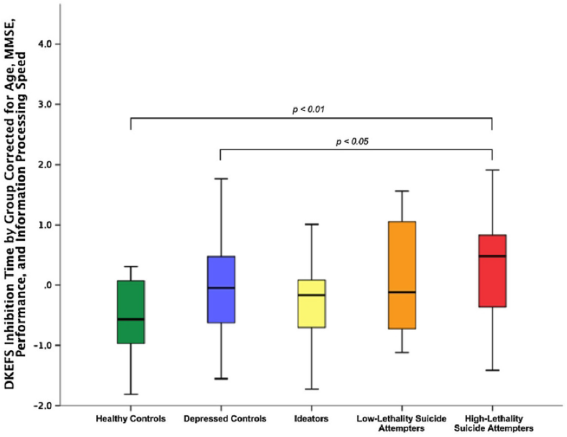Article contents
Cognitive Inhibition in Elderly High-lethality Suicide Attempters
Published online by Cambridge University Press: 15 April 2020
Abstract
People who attempt suicide often display cognitive impairments, particularly poor cognitive control. Could poor cognitive control contribute to high suicide rates in old age? A component of cognitive control, cognitive inhibition – active suppression of task-irrelevant processing – is very sensitive to aging and has been linked to attempted suicide. We investigated cognitive inhibition in older high-lethality suicide attempters, closely resembling suicide victims, as well as low-lethality attempters, and control groups with and without depression and suicidal ideation.
102 participants aged 60+ (17 psychiatrically healthy control subjects, 38 depressed control subjects, 16 suicide ideators, 14 low-lethality suicide attempters, and 17 high-lethality suicide attempters) underwent comprehensive clinical and cognitive assessments. They completed the Delis–Kaplan Executive Function System Color-Word Interference Test, a validated modification of the Stroop test.
High-lethality suicide attempters demonstrated a distinct pattern of cognitive inhibition deficits. Compared to psychiatrically healthy control subjects and non-suicidal depressed patients, high-lethality attempters took longer to complete inhibition trials, even after accounting for potential confounding factors (age, education, MMSE score, information processing speed, and accuracy). Compared to non-suicidal depressed and healthy control subjects, low-lethality suicide attempters committed more uncorrected errors; however, this difference was not specific to the inhibition condition.
Older suicide attempters are a cognitively heterogeneous group. Poor cognitive control in high-lethality attempters may undermine their ability to solve real-life problems, precipitating a catastrophic accumulation of stressors. Meanwhile, low-lethality attempters’ poor performance may reflect a careless approach to the task or faulty monitoring.

- Type
- Article: 1793
- Information
- European Psychiatry , Volume 30 , Issue S1: Abstracts of the 23rd European Congress of Psychiatry , March 2015 , pp. 1
- Copyright
- Copyright © European Psychiatric Association 2015
- 2
- Cited by





Comments
No Comments have been published for this article.